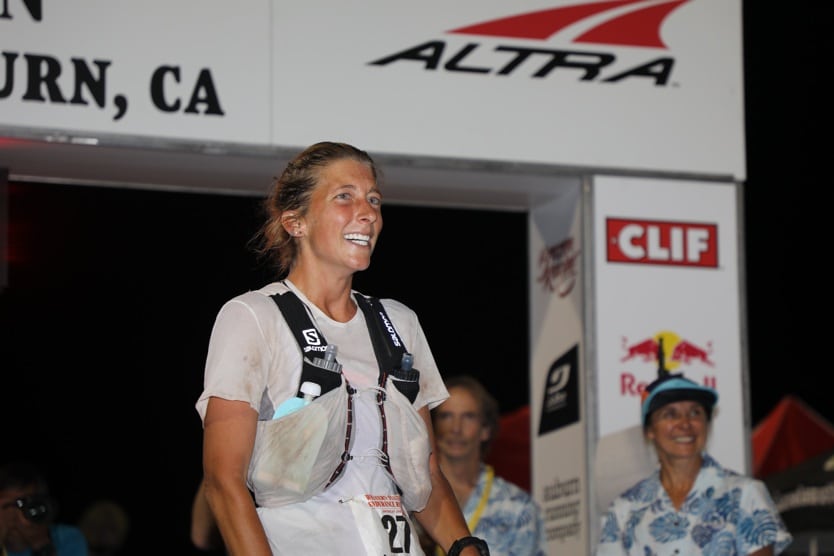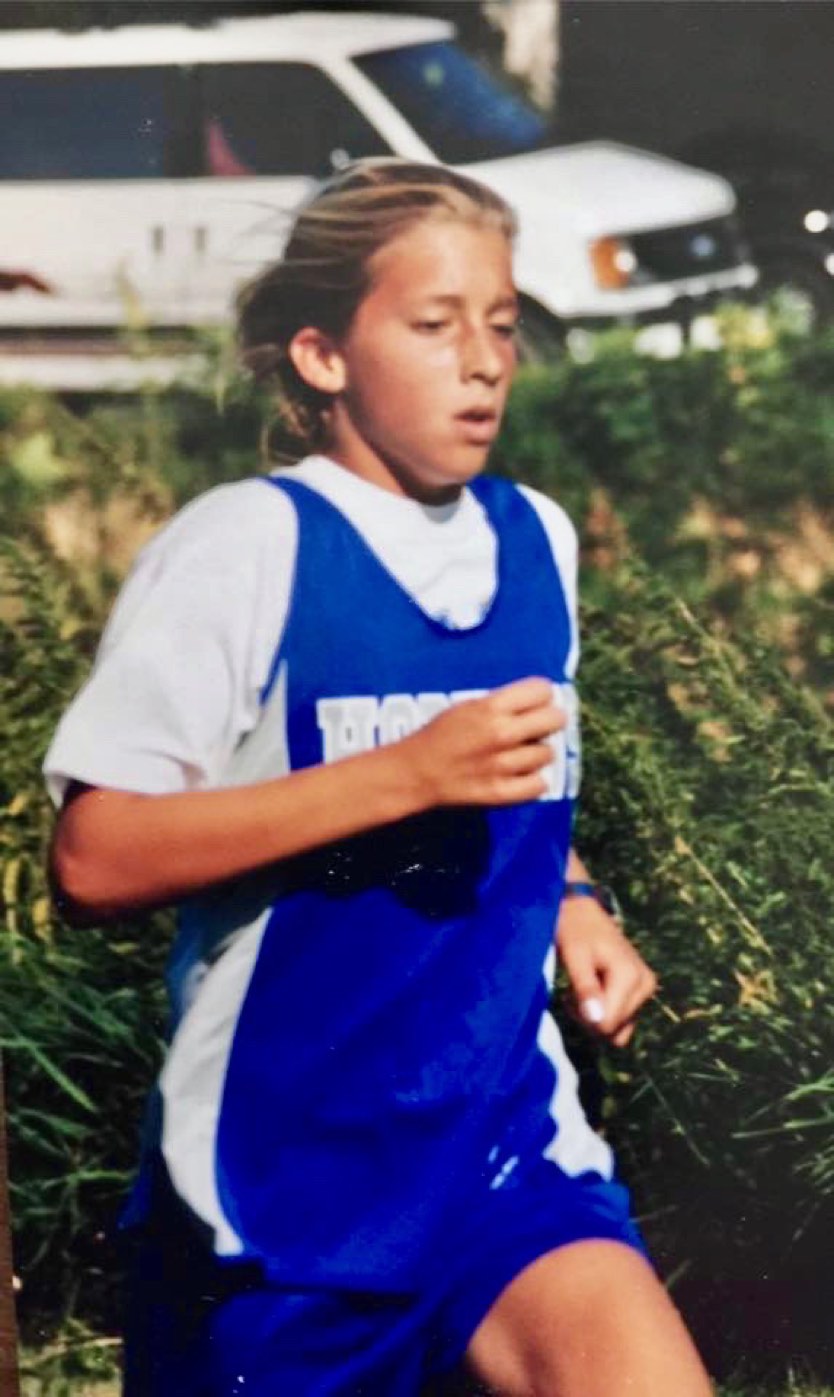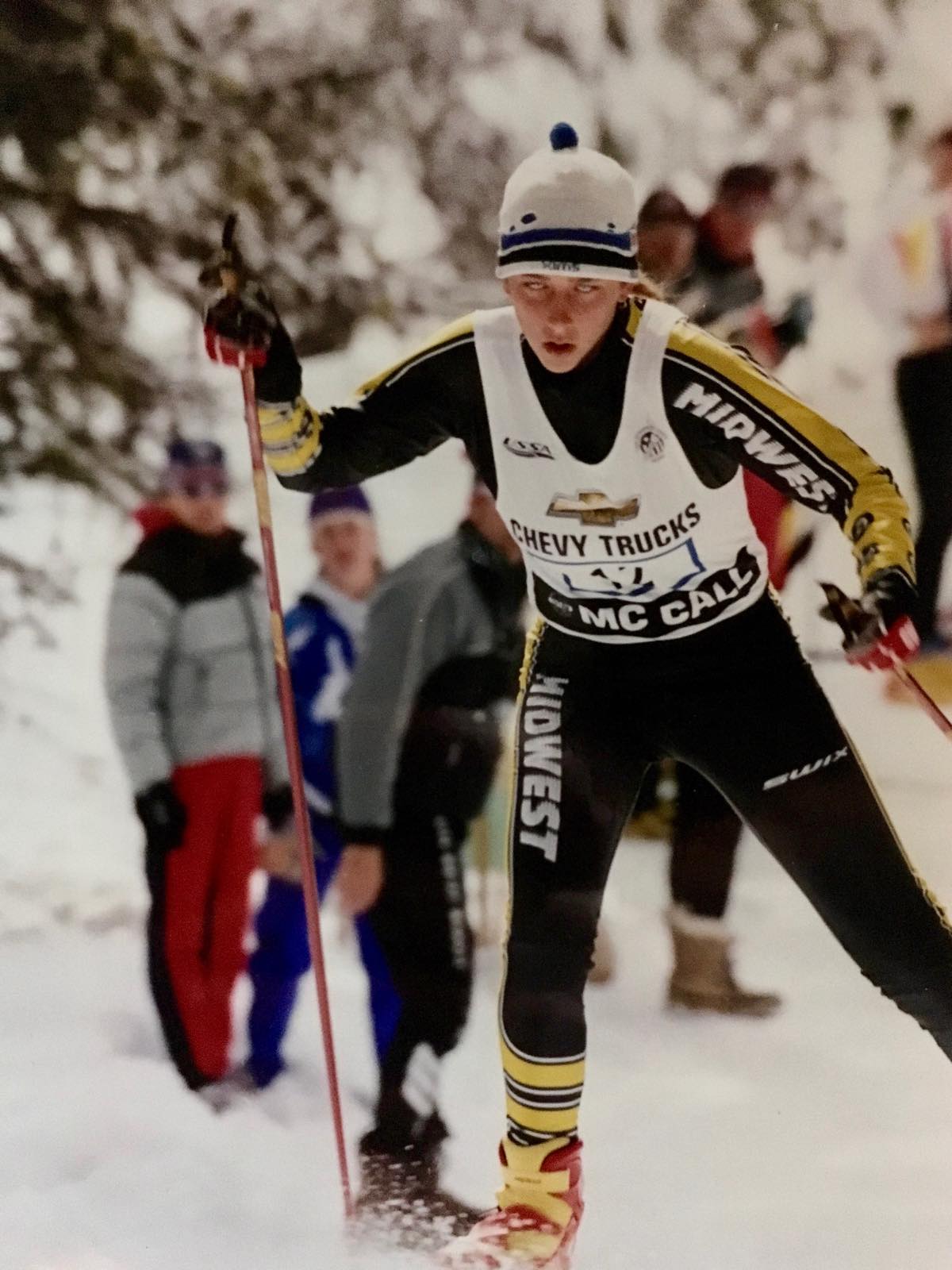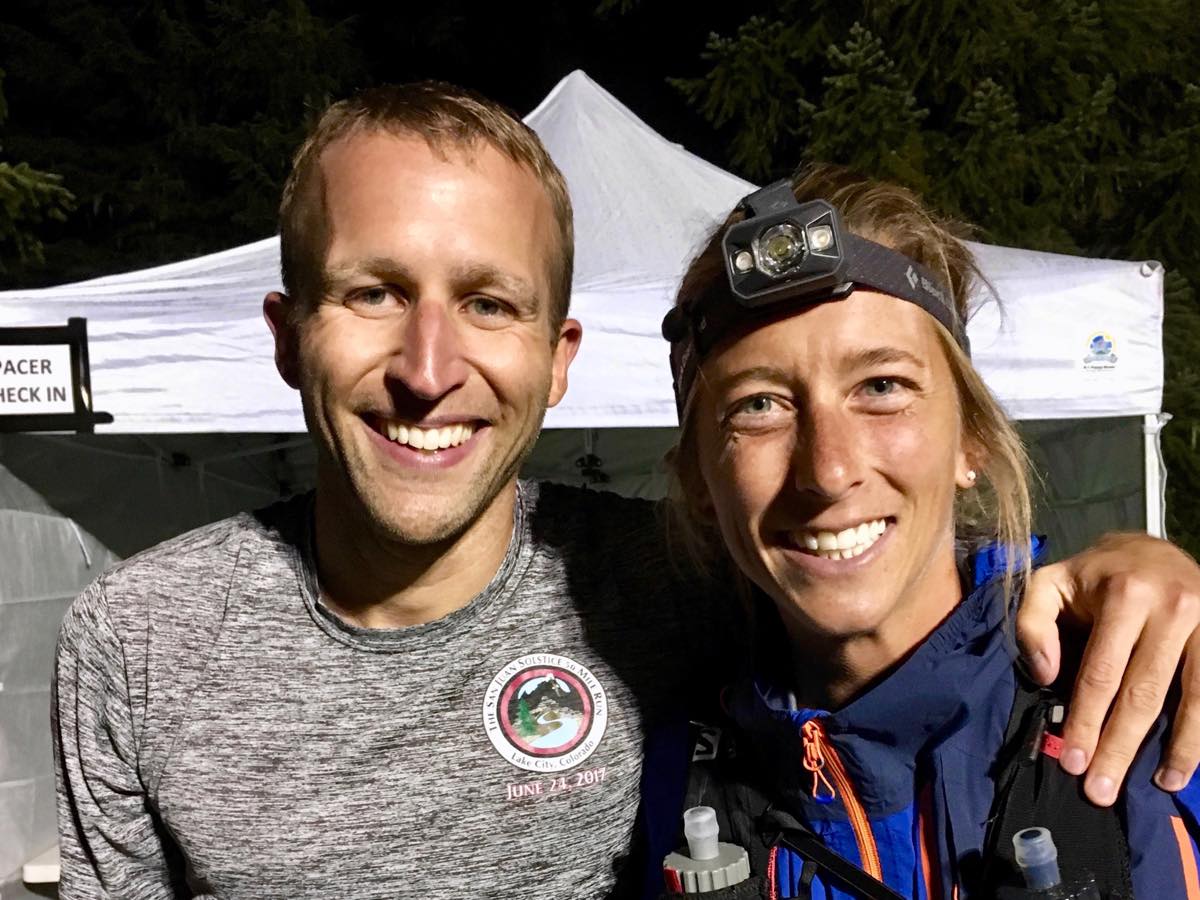[Editor’s Note: It’s our pleasure to welcome writer, coach, and runner Damian Hall to the iRunFar columnist team. In his monthly column, he’ll profile trail running and ultrarunning’s brightest stars. Welcome, Damian!]
Courtney Dauwalter won’t tell me a joke. That isn’t because the Coloradan is too serious. Quite the opposite. She likes jokes so much that they’re part of her running arsenal.
Sometimes during races–and Courtney also very much likes long races; 240 miles, 24-hour racing, that kind of thing–she tells jokes, to herself and others, to make sure her mind is still working. When future husband Kevin Schmidt, who she’d only been dating for two months at the time, turned up to pace her first 100 miler in 2012, he thoughtfully brought along a sheet of paper. In size-nine font, on both sides, were jokes. (That didn’t work out so well, but more on that shortly.) Since then, “jokes are a necessary piece of every race,” says Courtney.
Courtney has just had the racing season of her life. Last year, she ran the second-fastest-ever time for a woman at the Western States 100, one of eight wins in 2018, bringing her total to 31 at the time of this article’s publishing. The 33-year-old who was born in Minnesota wins at all kinds of long races, independent of terrain and distance–sometimes overall, too. In previous years, she’s set then national records in 24-hour racing. And did I mention that she loves jokes? But I’m finding that she doesn’t like telling them to relative strangers.
Courtney is something of a contradiction. On one hand, she’s a full-time athlete who runs 100-mile weeks and has been achieving sporting excellence since childhood. On the other hand, you have the smiley, joke-y, happy-go-lucky charm of a free spirit who trains without a plan and seems to mostly eat candy during races. The joking stuff is not typical behavior of most elite athletes, in any sport. So is she serious about this ultrarunning lark, or not?
Growing up, Courtney participated in a lot of sports. In seventh grade, she was already good enough to run for her high-school varsity cross-country team. During the winter, she would get up in the dark to Nordic ski before school, which helped turn her into a four-time state champion in cross-country skiing (for 5k Skate, 5k Classic, and Pursuit). All of this earned her All-American honors three times in high school and a scholarship to the University of Denver in Colorado.
She has always been competitive, says her dad. The deal was that if Courtney or her two brothers signed up for a sport, they had to finish the season, even if they didn’t love it. “After trying softball, I decided it wasn’t quite for me,” Courtney laughs–she’s always laughing. “But it was important, in our family, to see things through, to finish what you start.”
Her earliest memories of running are racing the mile in elementary school. “I loved it. I loved pushing myself really hard and that feeling you get when you race.” She learned some key lessons from Nordic skiing too. “I had an amazing coach who taught us how to go into the pain cave. That we could be feeling this way, but keep pushing. But he also taught us how to have fun with racing and training. I had great teammates too. It was the perfect recipe for growing a life-long love of endurance sport.”
She majored in biology, thinking perhaps physical therapy or sports medicine would be her calling. However blood and needles make her faint, so she turned to teaching, like her mom. “I think I always knew it was my path, but I was trying to swim upstream against it for a bit.” After earning her degree, Courtney taught biology, chemistry, and physical science to ninth graders in Mississippi.
Skiing isn’t such a big thing in Mississippi, where the climate is warm, so Courtney turned back to running. After a few road marathons, the 2011 Prickly Pear 50k trail race in Texas caught her fancy. “I was so psyched at the aid stations! I was grabbing handfuls of jelly beans and stuffing them in my pockets. I found that I loved spending time on the trails, weaving through the woods on singletrack.”
Her second ultramarathon, the Run Rabbit Run 50 Mile, “really got me hooked. It was freezing cold, it hailed and snowed, there was a torrential downpour, but people were just whooping and hollering. I remember thinking, I get it. This community is perfect!”
Her third ultra however, the 2012 Run Rabbit Run 100 Mile, didn’t go so well. Despite the aforementioned new boyfriend Kevin and his joke sheet, the race was her first and only DNF. (That’s unless you count the 2018 Big Backyard Ultra, which can only have one actual finisher, or her stopping early at the 2018 Desert Solstice Track Invitational, where she was planning to race for 24 hours. More on both shortly.) “It physically hurt and I didn’t realize how important that mental aspect was. When it started hurting I gave up and thought it wasn’t for me. Afterward I was so disappointed. In my family you finish what you start, but I hadn’t done that. I’d given up really quickly when it got hard. I reevaluated, made a new plan, and made sure the next time I wasn’t going to quit.”
She ran the 2013 FANS 24-Hour Race to get the 100-mile monkey off her back, racking up 105 miles there. In 2013 she raced six times, with several podiums. In 2014 she raced 11 times, with seven wins. In 2016 things really started to take off. In nine ultras, she only finished first or second. She credits her greater experience of racing for the upturn. “I also decided to put more effort into my training and preparation for races. That was more volume, but also more time on trails.”
After Mississippi, Courtney moved to Texas and taught one year of ninth-grade biology. “I missed the mountains, though, and wanted to head back to Colorado.” So she took a job teaching in Denver. Soon after, she moved outside of Denver where she could get onto trails straight from her door. “I’m not naturally good on trails. For my birthday the first year I was trail running, my parents sent me a huge box of Band-Aids–I would fall so much. I still fall and still use them!”
Courtney developed an appetite for 24-hour racing too. In 2017 she set a then women’s American record of 155.391 miles for 24 hours. “Oh man. Twenty-four-hour running is such a cool mental race. Physically you have to be prepared, for sure; but after a while out there, it’s just a mental game with yourself. On a trail you’re navigating and thinking about your foot placements, but on the track that part of your brain can totally turn off. Your mind gets to go to some pretty cool places.”
“The time can pass if you go down memory lane and rehash old memories, which can be pretty fun. There are so many games you can play with yourself too. I might promise myself that in eight laps I can have mashed potatoes. Or, I can’t think about laps or times for the next five songs–I like country music, Michael Jackson, Prince, late-’90s and early 2000s pop and rap, Disney hits. Or it might be brainstorming toppings for the nachos I want later. Then there are moments when it gets so physically hard that you just have to focus on that next step.”
Sometimes it gets really, really hard. Courtney has suffered two episodes of temporary blindness during races, including at the Moab 240 Mile, which she won outright in 2017. “I wouldn’t recommend it!” She chuckles. “I do not have any desire to experience [the vision problems] again, though at the time I wasn’t thinking about how scary it was. It has to do with contact lenses–I need to use eyedrops–and staying on top of calories. I was just curious about what else was possible. I love all distances: the shorter ones, when you’re done by happy hour and you can have a beer; and the 100-mile-plus distance. I do love the 100-mile distance. But you’ve got to try a 200!” She’s joking, right?
In the summer of 2017, Courtney was able to turn full-time with her running. “We’ve got no children, no pets, or even any plants that we’re trying to keep alive, so we thought, why not?” When she was teaching, her long run might be split across four runs, fitting in miles around a busy work day. Now she can get it done in one go. She usually runs 100 miles a week, mostly on feel. “I don’t have a plan. I’ll leave the house and I don’t know if I’m going to go out for 45 minutes or four hours. The only method to it is when my next race is. I’m conscious of whether I can load on the miles or try to stay fresh.”
She runs fast “sometimes: it’s usually not planned. I have certain runs I’ll do where certain sections I like to do intervals on, if I feel good. It’s never a dedicated track workout.” She does “a little bit” of core strength and curls some five-pound dumbbells “occasionally.” This winter she’ll get out cross-country skiing.
She insists she “didn’t do much different” in preparation for her momentous 2018 Western States win. “I didn’t worry about climbing so much in training. I mixed it up a bit with trails and road, but I didn’t change much otherwise.”
She sounds so relaxed about Western, but there must have been some nerves? “Oh yeah. I was so excited to take part in it and nervous about what would go down. It felt different, because there’s a lot more going on beforehand than other trail races. I was just walking around [Olympic Valley, California, where the race starts,] wide-eyed and trying to soak it all in.
“I felt a sense of relief when the gun finally went off and we could get down to business. There was no real race strategy, just easing into it. The first 30 miles I felt pretty terrible. I thought, Where’s my fitness, why am I breathing so hard, why don’t I feel strong? But it’s 100 miles and a lot can happen. My body started responding and the gears started turning, finally! I had no idea where I was in relation to times or splits–I never run to splits.”
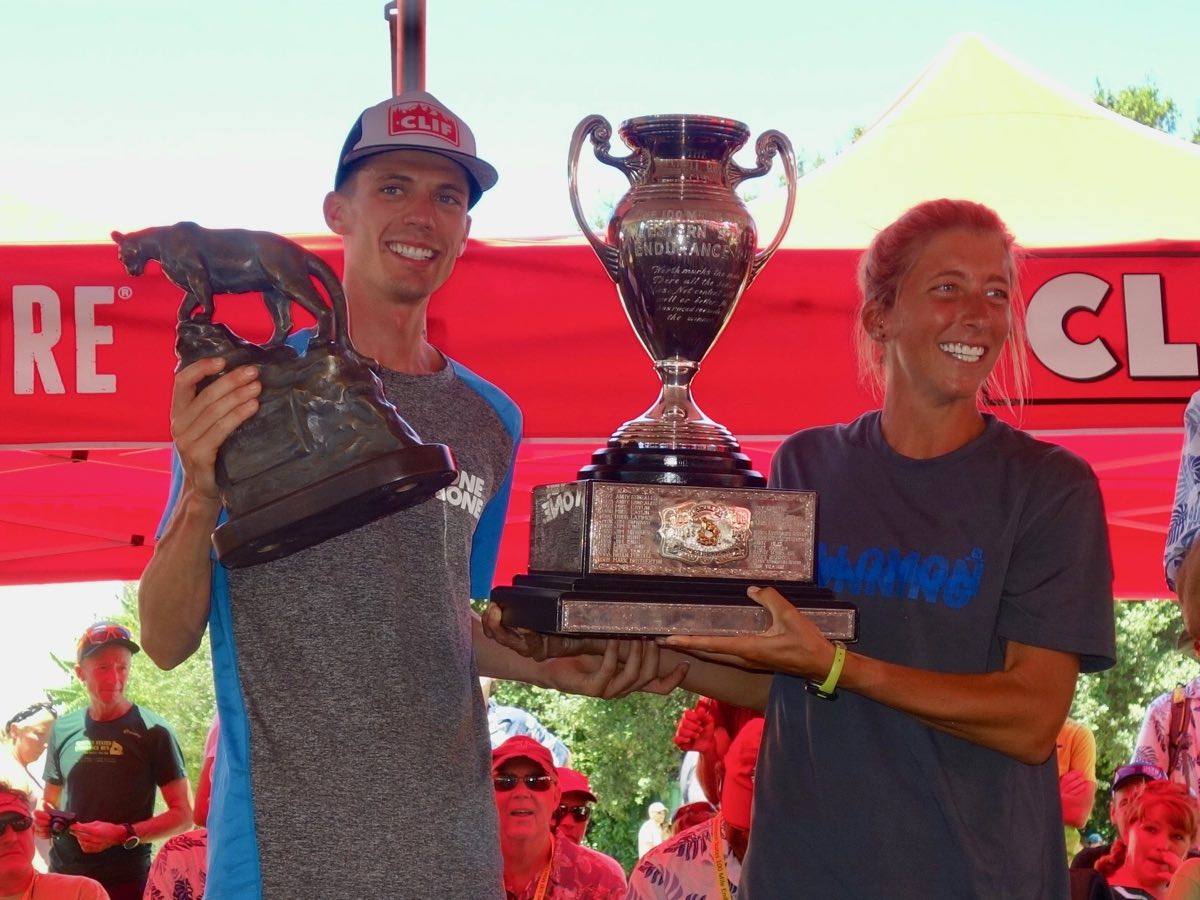
Courtney after winning the 2018 Western States 100 with men’s champion Jim Walmsley. Photo: iRunFar/Bryon Powell
Her other standout race from 2018 was the Big Backyard Ultra. In its torturous last-person-standing format, she clocked an extraordinary 279 miles in 67 hours, bettered only by Sweden’s Johan Steene. “It’s so cool! It was a weird time warp of a race. I finished on Tuesday but in my head it was still Sunday. Sleep management is huge and I wasn’t great at that. I tried some power naps but I never fully conked out. It got pretty [mentally] dark out there. It’s definitely on my list of something to go back to and try to improve on.” And the Barkley Marathons, another notoriously almost-impossible race? “It definitely intrigues me.”
Not quite everything Courtney touches turns to gold. At the end of her incredible 2018, she stopped early at December’s Desert Solstice 24-hour race. “I thought I could squeeze one more in, thought I could push off rest for a while longer. But that turned out to not be true. It was a good reminder that periods of rest are just as important as good training. It was nice and humbling!”
Even when she’s humbled, she seems lighthearted about it. So what makes her so good at this stuff? “That’s an awkward question,” she laughs. “I don’t know if it’s any one thing. I had a great upbringing and I’m competitive by nature, but also a combination of my teammates, coaches, and family… I don’t know.”
Indeed, husband Kevin has been key to her success, despite the pair’s inauspicious beginnings back to the 2012 Run Rabbit Run 100, where he turned up at mile 50 with his joke sheet in hand to pace her. “At mile 55, I was in the fetal position on the side of the trail, just totally worked from the race. It was brand-new territory for both of us. I think he made it through a few of the jokes, but my constant whimpering and dry heaving was making it too hard to hear the punchlines. We both kinda’ panicked. I felt I had to drop out or I’d die. We had no idea. It’s been cool to learn about this sport together, as a team.” The team married in the summer of 2015 and celebrated at her parent’s house in Minnesota. “It was an outdoor wedding, with a party of yard games, food trucks, and plenty of refreshments.” Nowadays at races, Kevin is the numbers guy. “It just goes like clockwork now. We have enough experience together that aid stations are NASCAR-style pit stops. He loves it and I feel really lucky that he loves it because I know that’s not guaranteed.” You must occasionally exchange words? “Not really, no. We don’t get angry at each other during those moments.”
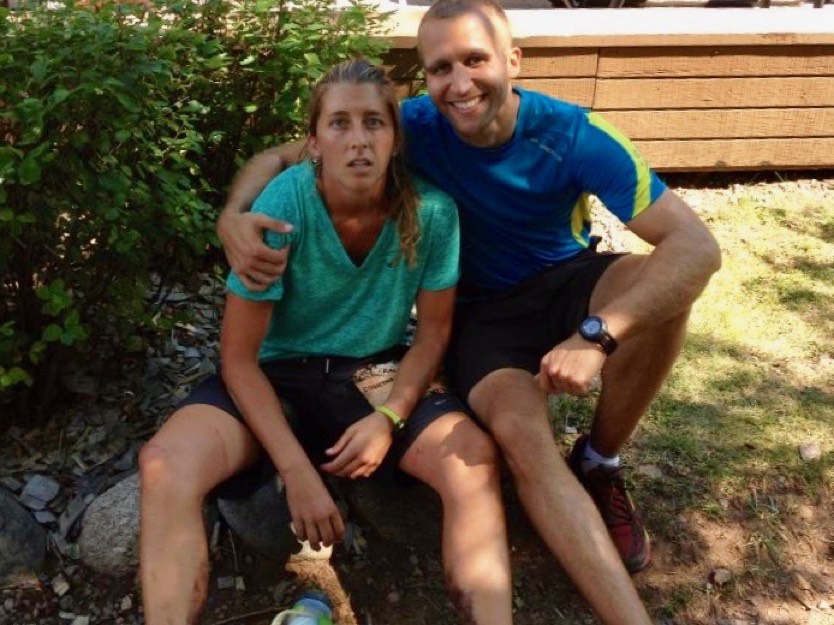
Courtney and husband Kevin Schmidt at the finish of the 2012 Superior 100 Mile. Photo courtesy of Courtney Dauwalter.
The jokes must help, too? “Ha. I’m still not telling you one. It won’t go well. That’s why I love ’em–I always mess ’em up. My favorite jokes are animals-walking-into-bars jokes. But I can’t be recorded telling a joke!”
So is Courtney deadly serious about her running, or does she think it’s all just a big laugh? Or is not being too serious about it, what makes her seriously good at it?
Call for Comments (from Meghan)
Calling all Courtney Dauwalter jokes, er, stories! Leave a comment to share your stories of racing, running, or hanging out at events with Courtney. And, has she told you a joke? Share that with us, too!
